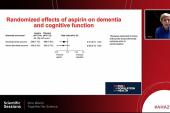Genetic Study Hints at Cognitive Impact of Statins, but Experts Urge Caution
Experts say these results should be interpreted very carefully, and worry they’ll be taken as a reason to stop statin therapy.

Lowering LDL-cholesterol levels with a statin may result in adverse neurocognitive effects whereas PCSK9 inhibitors, which also bring down LDL but through a different mechanism, may have a more neutral cognitive profile, according to a new mendelian randomization analysis. Experts not involved in the analysis, however, urged caution in interpreting the findings.
Among more than 740,000 participants enrolled in several genetic data banks, the study found that single nucleotide polymorphisms (SNPs) in 3-hydroxy-3-methylglutaryl-coenzyme A reductase (HMGCR)—the target of statin therapy involved in the synthesis of cholesterol—were associated with an adverse impact on several measures of cognitive function. These SNPs in HMGCR mimic the effect of statin therapy and suggest caution may be warranted when prescribing the LDL-lowering drugs.
“We observed some evidence of relationships between genetically modeled HMGCR inhibition and neurocognition,” senior investigator Falk W. Lohoff, MD (National Institutes of Health, Bethesda, MD), told TCTMD. “However, the mendelian randomization regression estimates between the HMGCR instrument were quite small. Therefore, given the important cardioprotective impact of statins, we underscore that any potential adverse effects of HMGCR inhibition on neurocognition found here likely do not outweigh the cardiovascular benefits of statin use.”
Steven Nissen, MD (Cleveland Clinic, OH), who wasn’t involved in the analysis, said that despite the overwhelming safety and efficacy data with statins, there remains a group of “statin deniers,” including those pitching supplements and other products for heart health, who argue the drugs cause harm. For that reason, he is concerned the message taken from this new analysis will be the wrong one.
“I worry this manuscript will result in significant public health harm,” Nissen told TCTMD. “I think there will be people who see this when it’s reported in the media and will want to stop taking statins. That’s not a good outcome. People will only read the headlines, and they’re not going to do a deep dive. They’re not going to recognize that this is not a clinical trial. It’s a mendelian randomization study, and I don’t find the evidence all that compelling.”
Any potential adverse effects of HMGCR inhibition on neurocognition found here likely do not outweigh the cardiovascular benefits of statin use. Falk Lohoff
In an editorial accompanying the paper, Brian Ference, MD (University of Cambridge, England), expresses similar concerns. The results of mendelian randomization studies in general—and particularly drug-target mendelian randomization studies, such as this one—should be “interpreted carefully and with extreme caution,” he said. This specific study doesn’t provide any good evidence that statins can cause cognitive impairment and that people taking statins should not discontinue therapy based on those fears, stresses Ference.
“Instead, this study serves as an important example of why it is necessary to carefully, deliberately, and cautiously interpret the clinical implications of drug-target mendelian randomization studies to avoid potentially ‘causing’ harm to patients,” he writes.
The study and editorial were published August 8, 2022, in the Journal of the American College of Cardiology.
Lack of Long-term Data
Ten years ago, the US Food and Drug Administration updated the labels of statin medications to warn of a possible association with cognitive impairment, noting that the side effect is generally nonserious and reversible if statins are stopped. Over the years, statin-associated changes in memory and/or cognition have surfaced in various studies, analyses, and reports, but the evidence has generally been weak.
Some studies have shown that memory and cognitive function may be impaired by statins, some show no cognitive decline, and others have hinted that statins may actually decrease the risk of dementia, Alzheimer’s disease, and neurological impairment in some patients. Multiple meta-analyses and reviews have been published over the years, with most, but not all, concluding that statins do not have an adverse effect on cognition or dementia. In 2018, the American Heart Association issued a scientific statement to say there was no convincing evidence of a causal relationship between statin use and cognitive function.
Last year, an analysis from ASPREE found that statin therapy in adults 65 years and older was not associated with incident dementia, mild cognitive impairment, or any individual measures, such as global cognition, memory, language and executive function, and psychomotor speed.
Addressing possible risks with the newer PCSK9 inhibitors, the EBBINGHAUS trial, which was a subanalysis from the FOURIER trial of evolocumab (Repatha; Amgen), showed the drug had no impact on a variety of cognitive measures compared with placebo over 19 months of follow-up.
I worry this manuscript will result in significant public health harm. Steven Nissen
“One of the main limitations of the existing RCTs for statins and PCSK9 inhibitors in the neurocognitive space is the comparatively short study and follow-up times,” said Lohoff. Given this lack of long-term data, the researchers wanted to study the genetics-based relationships between HMGCR and PCSK9 inhibition and a range of neurocognitive endpoints.
The drug-target mendelian randomization analysis assessed PCKS9 and HMGCR inhibition by focusing on SNPs in located in PCSK9 and HMGCR associated with lower LDL cholesterol levels in a previously published genome-wide association study. Data sources included patients of predominantly European ancestry part of the Alzheimer’s Disease Neuroimaging Initiative, UK Biobank, and Global Lipid Genomics Consortium, among others.
There was no significant association between PCSK9 inhibition and any measure of cognitive function, whereas HMGCR inhibition was associated with detrimental effects on cognitive performance (beta = -0.082; P = 0.03), reaction times (beta = 0.00064; P = 0.0002), and average cortical surface area (beta = -0.18; P = 0.03). Neither PCSK9 nor HMGCR inhibition had any effect on Alzheimer’s disease-related outcomes or Lewy body dementia.
Placing the evidence in the context of other studies, Lohoff said the data suggest PCSK9 inhibition has a “neutral neurocognitive impact,” but that additional studies are needed, particularly long-term randomized, controlled trials assessing the drug’s effects on neurocognition in different patient populations.
‘No Clear Biologically Plausible Mechanism’
Vijay Nambi, MD (Baylor College of Medicine, Houston, TX), who wasn’t involved in the analysis, said any study suggesting even potential harm needs to be placed in the context of vast evidence showing statins safely reduce atherosclerotic cardiovascular events.
One of the best randomized, controlled trials showing that statins are safe in a population who might be vulnerable to cognitive impairment is PROSPER, said Nambi. In that 2002 study of elderly patients (aged 70 to 82 years) with or at high of developing vascular disease, investigators saw no signs of cognitive impairment or disability over 3.2 years follow-up. Even in this latest mendelian randomization analysis, the estimated effect size on cognitive performance was extremely small, he said.
Cardiologists will have a few patients who say that they’re not as quick once they’ve started statins. Vijay Nambi
While the data have clearly shown the benefits of the drug class outweigh the risks, Nambi said some physicians may have lingering concerns when patients come to them with side-effect worries. “Cardiologists will have a few patients who say that they’re not as quick once they’ve started statins,” Nambi told TCTMD. “These are anecdotal data and only a small number of patients. It’s not the norm. It’s uncommon.”
If patients are anxious about their mental acuity, Nambi said the goal is to work through it with them to see if anything else could be contributing to the decline. Patients are aware of the potential side effects with drugs and rightfully concerned, but most treated with statins tend to be older, so their memory and cognition aren’t as sharp as they used to be, he noted. In practice, cognitive impairment rates further down the list than other side effects such as myopathy and new-onset diabetes.
“If I take 100 people . . . there isn’t going to be much memory change or deterioration,” said Nambi. But statins “might help one or two people by preventing a stroke”—perhaps the same number in whom there might be a minimal effect on cognition. With that trade-off, it’s not going to change physician practice, he added.
In the editorial, Ference highlights multiple reasons why physicians shouldn’t be worried by these results, first noting that the genetic instruments—SNPs near HMGCR and PCSK9—do not reflect activity of the drugs they are mimicking.
“The PCSK9 monoclonal antibodies do not cross the blood-brain barrier, and only hydrophilic statins have even weak central activity,” he writes. “Second, nervous system cells produce their own cholesterol to maintain membrane integrity. Therefore, there is no clear biologically plausible mechanism by which lowering peripheral cholesterol concentration with a statin can cause cognitive impairment.”
Moreover, prior mendelian randomization studies have concluded that LDL cholesterol is not associated with dementia, Alzheimer’s disease, or vascular dementia, says Ference.
Nissen said he, too, is not concerned about any of these risks when prescribing statin therapy to patients. “There’s no real good documentation of cognitive functional changes in people on statins and we’ve been studying these drugs for decades in large, randomized trials,” he said. “This has not been seen.”
Michael O’Riordan is the Managing Editor for TCTMD. He completed his undergraduate degrees at Queen’s University in Kingston, ON, and…
Read Full BioSources
Rosoff DB, Bell AS, Jung J, et al. Mendelian randomization study of PCSK9 and HMG-CoA reductase inhibition and cognitive function. J Am Coll Cardiol. 2022;80:653-662.
Ference BA. Interpreting the clinical implications of drug-target Mendelian randomization studies. J Am Coll Cardiol. 2022;80:663-665.
Disclosures
- Lohoff and Nambi report no relevant conflicts of interest.
- Ference reports research grants from Novartis, Amgen, Merck, Pfizer, and Esperion Therapeutics; personal fees for consulting, advisory boards, and lectures from Novartis, Amgen, Regeneron, Sanofi, Merck, Pfizer, Eli Lilly, Novo Nordisk, AstraZeneca, Viatris, The Medicines Co, Mylan, Daiichi-Sankyo, dalCOR, CiVi Pharma, KrKa Pharmaceuticals, the American College of Cardiology, the European Society of Cardiology, and the European Atherosclerosis Society.
- Nissen reports consulting for multiple pharmaceutical companies but doesn’t accept honoraria or payment.





Comments